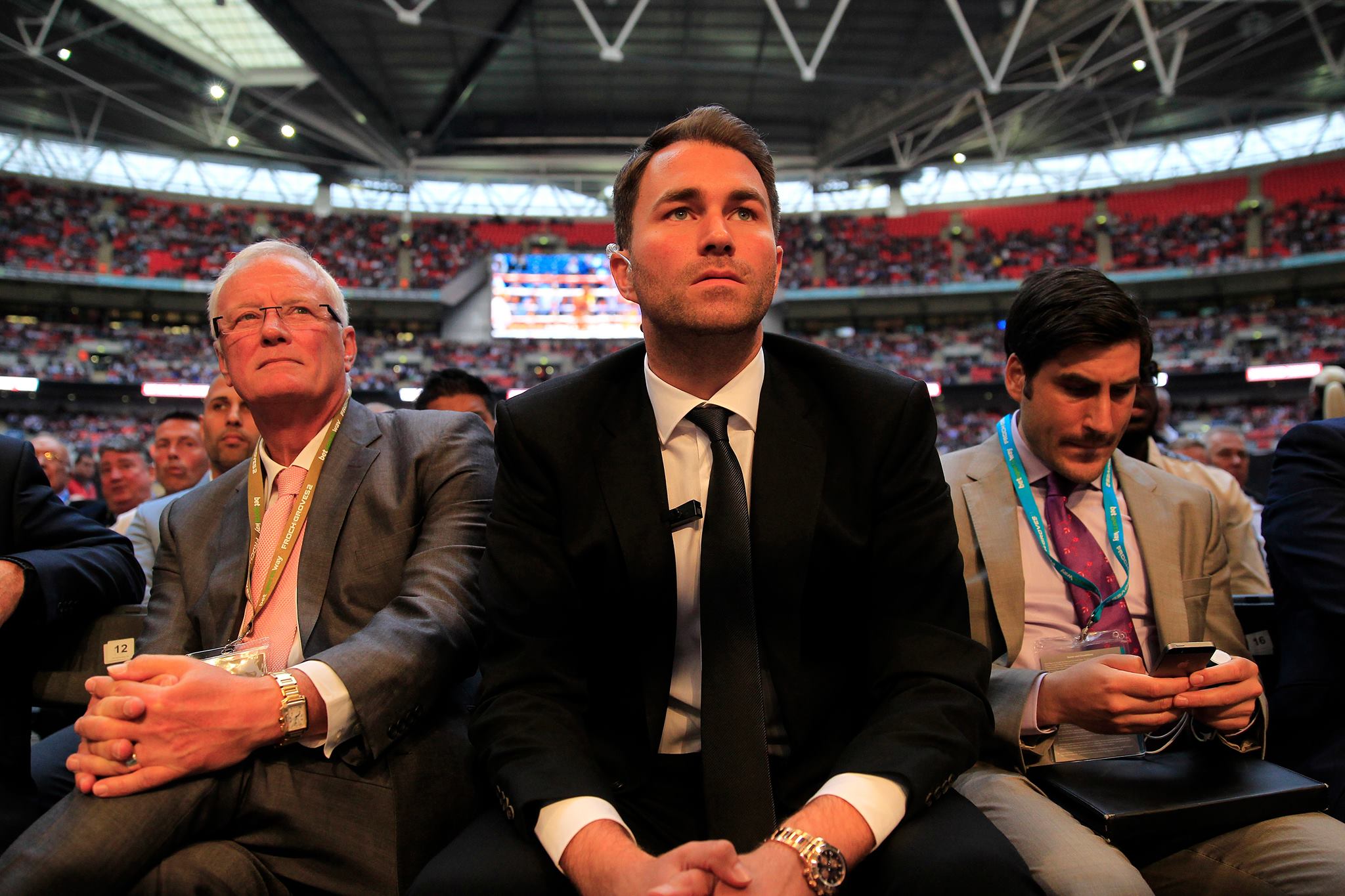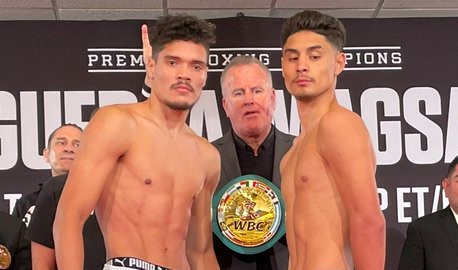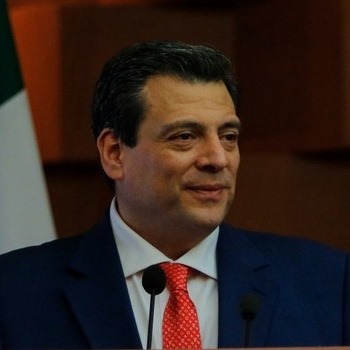by Charles Jay
Those who are relatively new to boxing (i.e., those who have started to follow it in the last ten years or so) may be wondering why boxing has not had a foothold on network television of late.
After all, with TV networks always on the lookout for affordable sports programming and avenues like social media open to support the promotion of such programming, all of the ingredients should be in place. All it takes is to make great fights, and perhaps get a little lucky. Right? Well, many television people, including NBC’s own Jon Miller, who is their programming head, will tell you that the uncertainty of boxing matches, which sometimes suffer from pullouts, and the tendency on the part of promoters to protect their “properties” at all costs, thus resulting in a lower quality of matchups, are contributing factors to the hesitation sponsors have had in going “all in” behind the sport.
There is an inherent problem, of course. The nature of the sport is such that pullouts are always going to be part of the game, and it often can’t be helped because of injuries and illness. While an injury wouldn’t necessarily ruin a football or basketball telecast, it could greatly change the nature of a boxing telecast, particularly if one or both of the combatants are well-recognized as a brand. This is one of the reasons why networks had been known in the past to deal with a small circle of promoters. When a commitment is made to a TV boxing date, and something unexpected happens, it is often what a promoter is able to do afterward that can salvage things.
This is where the “double-edged sword” comes in. Some promoters have been known to substitute garbage, acknowledging that there is certain leverage created by the short notice. There have even been inexperienced, unprepared promoters who have let an entire show fall apart, leaving television people scrambling for a solution. Others might prefer to insert something that may not have the marquee value but is even MORE competitive. That may not often occur; it depends on how strong the network’s position is and how much the promoter actually “gets it.” Regardless, there is a great deal of value placed on “deliverability” as a key to a promoter’s ability to secure dates. And the promoters who are able to secure dates, in turn, usually have quite a few fighters under contract – fighters for whom they have bigger plans.
By and large, when it came to the network level, there was some point at which the promoters began to have a tendency to protect their own; that is, the fighter they had under control, as promotional deals became more and more prevalent. Then it was a matter of getting away with the LEAST competitive fight they could, with was at odds, ideally, with what the network was seeking.
What we’re trying to explain is that there is something in the fabric of how this business currently operates that has made it somewhat less user-friendly for the broadcast networks to do business with, and some changes in philosophy have to take effect for things to get back to the level where boxing on the networks is a more frequent occurrence.
Many of the people working in the fight game right now were weaned on the weekend fights that appeared on all three of the networks (ABC, NBC, CBS). They were considered a very important part of a chain of development, not only of the fighters, but of those fighters as attractions. Generally the progression went from the local club show, to cable (as it started to blossom), to network television, to premium cable (HBO, Showtime, etc. as it was available) to pay-per-view. At one point at least one link in that chain was skipped – the role of the networks. Perhaps it was a combination of the fights that might normally be earmarked for that destination winding up on either basic cable or pay (premium) cable – more often than not the latter.
That notwithstanding, the aforementioned solipsistic attitude on the part of promoters – with more of a stake in fighters and therefore less interest in risk – has hurt boxing, both on network TV as well as cable. When the networks were paying good money for fights, and not making “output” deals (package deals with promoters, in the absence of buying individual fights), they were able to command better matchups, at least if they sought to use their own leverage to the fullest, and it was more about the cream rising to the top. Certainly, network people were not blind to the fact that there was the possibility of some genuine stars emerging, and they did, on occasion, make allowances in terms of the matchmaking to affect that.
One thing you would see on the networks, however, was some depth on the cards. NBC in particular would have backup fights, and interesting ones, just in case a main event unexpectedly ended early, or in the case of John “The Beast” Mugabi, quite expectedly. By having other boxing programming at the ready, advertisers knew that viewers would stay interested. And they did.
But that involved a spirit of matchmaking that is intended to serve the viewer, not the promoter. There’s a big difference there. NBC is going to do a couple of network fights over the air as part of its cable deal with the New Jersey-based Main Events promotional outfit, which is working with J. Russell Peltz, a Hall of Fame promoter/.matchmaker who truly understands what it takes to put together a fight the public is going to like, even if it means the “house” fighter may be in tough. Peltz’s career extends back to an earlier era, before promotional contracts began to dominate the landscape, so his sensibilities are probably a bit different than some fight people who arrived long after him. Ask anyone who has ever attended the shows he used to do at the Blue Horizon in Philadelphia.
But really, how many more Russell Peltzes are there? This sport will need more of them to make a compelling case for once again becoming a regular staple on broadcast television.



















LarryFex
06/25/2024 at 12:55 am
pin up casino azerbaycan: pin-up cazino – pin-up kazino
Williamfrumn
06/26/2024 at 8:25 am
medicine in mexico pharmacies: northern doctors pharmacy – mexican drugstore online
JeffreyMok
06/26/2024 at 9:27 am
https://northern-doctors.org/# buying prescription drugs in mexico
Williamfrumn
06/26/2024 at 10:54 am
reputable mexican pharmacies online: mexican pharmacy – mexico drug stores pharmacies
Richardled
06/26/2024 at 12:05 pm
pharmacies in mexico that ship to usa [url=https://northern-doctors.org/#]mexican pharmacy online[/url] mexican border pharmacies shipping to usa
JeffreyMok
06/26/2024 at 12:35 pm
https://northern-doctors.org/# mexican online pharmacies prescription drugs
JeffreyMok
06/26/2024 at 6:27 pm
https://northern-doctors.org/# mexican drugstore online
Richardled
06/26/2024 at 7:09 pm
buying prescription drugs in mexico [url=http://northern-doctors.org/#]northern doctors[/url] buying prescription drugs in mexico online
JeffreyMok
06/26/2024 at 9:13 pm
http://northern-doctors.org/# best online pharmacies in mexico
Williamfrumn
06/27/2024 at 1:32 am
mexican border pharmacies shipping to usa: mexican northern doctors – mexico pharmacy
Richardled
06/27/2024 at 2:53 am
mexican drugstore online [url=https://northern-doctors.org/#]northern doctors pharmacy[/url] buying prescription drugs in mexico online
Richardled
06/27/2024 at 4:49 am
medicine in mexico pharmacies [url=http://northern-doctors.org/#]buying from online mexican pharmacy[/url] mexico pharmacies prescription drugs
JeffreyMok
06/27/2024 at 5:24 am
https://northern-doctors.org/# mexican rx online
JeffreyMok
06/27/2024 at 6:07 am
http://northern-doctors.org/# reputable mexican pharmacies online
Williamfrumn
06/27/2024 at 6:53 am
best online pharmacies in mexico: mexico drug stores pharmacies – mexico pharmacy
JeffreyMok
06/27/2024 at 8:20 am
http://northern-doctors.org/# best online pharmacies in mexico
JeffreyMok
06/27/2024 at 9:07 am
http://northern-doctors.org/# reputable mexican pharmacies online
Williamfrumn
06/27/2024 at 10:49 am
mexican pharmaceuticals online: mexican northern doctors – mexican mail order pharmacies
Richardled
06/27/2024 at 12:14 pm
mexico drug stores pharmacies [url=https://northern-doctors.org/#]mexican northern doctors[/url] mexico pharmacies prescription drugs
Richardled
06/27/2024 at 2:13 pm
mexican drugstore online [url=https://northern-doctors.org/#]Mexico pharmacy that ship to usa[/url] mexican pharmaceuticals online
JeffreyMok
06/27/2024 at 4:40 pm
http://northern-doctors.org/# purple pharmacy mexico price list
Williamfrumn
06/27/2024 at 5:47 pm
buying prescription drugs in mexico online: northern doctors – mexico drug stores pharmacies
JeffreyMok
06/27/2024 at 6:34 pm
https://northern-doctors.org/# medicine in mexico pharmacies
JeffreyMok
06/27/2024 at 7:10 pm
https://northern-doctors.org/# mexican rx online
Richardled
06/27/2024 at 9:11 pm
mexican border pharmacies shipping to usa [url=https://northern-doctors.org/#]mexican pharmacy online[/url] mexican rx online
Williamfrumn
06/27/2024 at 9:18 pm
medicine in mexico pharmacies: buying prescription drugs in mexico – mexican pharmacy
JeffreyMok
06/27/2024 at 9:45 pm
http://northern-doctors.org/# reputable mexican pharmacies online
Richardled
06/27/2024 at 11:06 pm
buying from online mexican pharmacy [url=https://northern-doctors.org/#]mexican northern doctors[/url] buying from online mexican pharmacy
JeffreyMok
06/28/2024 at 12:27 am
https://northern-doctors.org/# medicine in mexico pharmacies
Williamfrumn
06/28/2024 at 12:33 am
mexico pharmacies prescription drugs: buying from online mexican pharmacy – mexican drugstore online
Williamfrumn
06/28/2024 at 12:43 am
medication from mexico pharmacy: mexican pharmacy online – mexico pharmacy
Williamfrumn
06/28/2024 at 2:09 am
purple pharmacy mexico price list: northern doctors pharmacy – buying prescription drugs in mexico online
Williamfrumn
06/28/2024 at 2:18 am
mexican pharmacy: northern doctors pharmacy – mexican mail order pharmacies
JeffreyMok
06/28/2024 at 3:03 am
http://northern-doctors.org/# mexican border pharmacies shipping to usa
Williamfrumn
06/28/2024 at 3:54 am
mexican mail order pharmacies: mexican pharmacy online – mexican mail order pharmacies
JeffreyMok
06/28/2024 at 5:39 am
http://northern-doctors.org/# medication from mexico pharmacy
Richardled
06/28/2024 at 6:11 am
п»їbest mexican online pharmacies [url=http://northern-doctors.org/#]mexican pharmacy online[/url] mexican mail order pharmacies
Williamfrumn
06/28/2024 at 6:54 am
mexico pharmacy: mexican pharmacy online – mexican drugstore online
Williamfrumn
06/28/2024 at 7:03 am
medicine in mexico pharmacies: northern doctors – mexican online pharmacies prescription drugs
JeffreyMok
06/28/2024 at 7:38 am
http://northern-doctors.org/# pharmacies in mexico that ship to usa
Richardled
06/28/2024 at 8:02 am
buying prescription drugs in mexico online [url=https://northern-doctors.org/#]northern doctors pharmacy[/url] medicine in mexico pharmacies
JeffreyMok
06/28/2024 at 8:18 am
http://northern-doctors.org/# buying prescription drugs in mexico online
Williamfrumn
06/28/2024 at 10:11 am
mexico drug stores pharmacies: mexican pharmacy online – buying from online mexican pharmacy
JeffreyMok
06/28/2024 at 11:01 am
https://northern-doctors.org/# buying prescription drugs in mexico
Williamfrumn
06/28/2024 at 11:52 am
mexico drug stores pharmacies: mexican pharmacy – purple pharmacy mexico price list
JeffreyMok
06/28/2024 at 1:01 pm
http://northern-doctors.org/# mexico pharmacy
Williamfrumn
06/28/2024 at 1:29 pm
п»їbest mexican online pharmacies: northern doctors pharmacy – mexican online pharmacies prescription drugs
JeffreyMok
06/28/2024 at 1:40 pm
https://northern-doctors.org/# mexico pharmacies prescription drugs
Williamfrumn
06/28/2024 at 3:08 pm
mexico drug stores pharmacies: northern doctors pharmacy – mexico pharmacy
Richardled
06/28/2024 at 3:12 pm
pharmacies in mexico that ship to usa [url=https://northern-doctors.org/#]Mexico pharmacy that ship to usa[/url] purple pharmacy mexico price list
Williamfrumn
06/28/2024 at 3:19 pm
medicine in mexico pharmacies: mexican pharmacy online – purple pharmacy mexico price list
Williamfrumn
06/28/2024 at 4:54 pm
best online pharmacies in mexico: northern doctors pharmacy – mexican online pharmacies prescription drugs
Richardled
06/28/2024 at 5:06 pm
mexico drug stores pharmacies [url=https://northern-doctors.org/#]mexican pharmacy northern doctors[/url] best online pharmacies in mexico
JeffreyMok
06/28/2024 at 7:08 pm
http://northern-doctors.org/# medication from mexico pharmacy
Williamfrumn
06/28/2024 at 8:26 pm
buying prescription drugs in mexico online: mexican pharmacy online – п»їbest mexican online pharmacies
JeffreyMok
06/28/2024 at 9:45 pm
https://northern-doctors.org/# mexican pharmacy
Williamfrumn
06/28/2024 at 9:56 pm
best online pharmacies in mexico: best online pharmacies in mexico – mexico pharmacies prescription drugs
Williamfrumn
06/28/2024 at 10:06 pm
mexican pharmacy: mexican northern doctors – medicine in mexico pharmacies
Williamfrumn
06/28/2024 at 11:34 pm
mexican pharmaceuticals online: mexican pharmacy northern doctors – buying from online mexican pharmacy
JeffreyMok
06/28/2024 at 11:42 pm
http://northern-doctors.org/# mexico drug stores pharmacies
Williamfrumn
06/28/2024 at 11:43 pm
mexico pharmacy: mexican pharmacy online – medication from mexico pharmacy
Richardled
06/29/2024 at 12:15 am
pharmacies in mexico that ship to usa [url=https://northern-doctors.org/#]medicine in mexico pharmacies[/url] mexican drugstore online
JeffreyMok
06/29/2024 at 12:21 am
https://northern-doctors.org/# medicine in mexico pharmacies
Williamfrumn
06/29/2024 at 1:11 am
best online pharmacies in mexico: mexican pharmacy northern doctors – mexican border pharmacies shipping to usa
Jeffreyber
06/29/2024 at 2:56 am
https://cmqpharma.online/# п»їbest mexican online pharmacies
mexican online pharmacies prescription drugs
Jeffreyber
06/29/2024 at 3:12 am
https://cmqpharma.online/# purple pharmacy mexico price list
buying from online mexican pharmacy
Ronnienop
06/29/2024 at 3:51 am
best online pharmacies in mexico [url=http://cmqpharma.com/#]online mexican pharmacy[/url] mexican mail order pharmacies
Ronnienop
06/29/2024 at 9:38 am
mexico pharmacies prescription drugs [url=http://cmqpharma.com/#]cmqpharma.com[/url] reputable mexican pharmacies online
Stephenrhype
06/29/2024 at 9:57 am
medication from mexico pharmacy: mexico pharmacy – medicine in mexico pharmacies
Ronnienop
06/29/2024 at 12:25 pm
mexican online pharmacies prescription drugs [url=https://cmqpharma.com/#]mexican online pharmacy[/url] medication from mexico pharmacy
DonaldBiono
06/29/2024 at 1:29 pm
mexican drugstore online
http://cmqpharma.com/# mexican rx online
mexico pharmacies prescription drugs
Ronnienop
06/29/2024 at 3:16 pm
best online pharmacies in mexico [url=https://cmqpharma.online/#]cmq pharma[/url] mexican pharmaceuticals online
Ronnienop
06/29/2024 at 6:23 pm
buying prescription drugs in mexico [url=https://cmqpharma.online/#]cmq mexican pharmacy online[/url] п»їbest mexican online pharmacies
Ronnienop
06/29/2024 at 9:24 pm
buying from online mexican pharmacy [url=https://cmqpharma.com/#]mexican border pharmacies shipping to usa[/url] mexican drugstore online
Ronnienop
06/30/2024 at 12:08 am
mexican rx online [url=https://cmqpharma.com/#]cmq pharma mexican pharmacy[/url] mexico pharmacies prescription drugs
Ronnienop
06/30/2024 at 2:54 am
mexican mail order pharmacies [url=https://cmqpharma.online/#]medicine in mexico pharmacies[/url] medicine in mexico pharmacies
Jeffreyber
07/02/2024 at 2:50 am
https://cmqpharma.online/# mexican online pharmacies prescription drugs
mexican online pharmacies prescription drugs
Ronnienop
07/02/2024 at 3:56 am
mexico drug stores pharmacies [url=https://cmqpharma.com/#]mexico pharmacy[/url] mexican pharmacy
IrvinErync
07/09/2024 at 2:04 am
reputable mexican pharmacies online: mexican pharmacy online – mexican pharmacy
CharlesRor
07/19/2024 at 9:27 pm
canadian pharmacy online store [url=http://canadapharmast.com/#]canadian online drugstore[/url] best canadian pharmacy
CharlesRor
07/19/2024 at 10:10 pm
legitimate canadian pharmacies [url=http://canadapharmast.com/#]my canadian pharmacy reviews[/url] canada ed drugs
EdwardLoobe
07/20/2024 at 2:34 am
https://foruspharma.com/# medicine in mexico pharmacies
CharlesRor
07/20/2024 at 4:58 am
canadian pharmacy 24 [url=https://canadapharmast.com/#]canadian pharmacy world[/url] certified canadian pharmacy
Davidtoows
07/20/2024 at 7:05 am
indian pharmacies safe: online shopping pharmacy india – buy medicines online in india
Michaelmoolo
07/20/2024 at 12:10 pm
buy prescription drugs from india: indian pharmacies safe – indianpharmacy com
Davidtoows
07/20/2024 at 12:52 pm
medication from mexico pharmacy: buying prescription drugs in mexico – buying from online mexican pharmacy
EdwardLoobe
07/20/2024 at 3:42 pm
http://canadapharmast.com/# rate canadian pharmacies
CharlesRor
07/20/2024 at 11:45 pm
online pharmacy india [url=https://indiapharmast.com/#]india pharmacy mail order[/url] pharmacy website india
CharlesRor
07/21/2024 at 12:46 am
mexico pharmacies prescription drugs [url=https://foruspharma.com/#]mexico drug stores pharmacies[/url] mexico drug stores pharmacies
EdwardLoobe
07/21/2024 at 3:23 am
https://indiapharmast.com/# india online pharmacy
Davidtoows
07/21/2024 at 4:42 am
reputable mexican pharmacies online: medication from mexico pharmacy – mexican pharmaceuticals online
Michaelmoolo
07/21/2024 at 6:29 am
Online medicine order: indian pharmacy paypal – buy prescription drugs from india
Jamesjam
07/21/2024 at 6:05 pm
buy paxlovid online: paxlovid price – paxlovid buy
Myronnepay
07/22/2024 at 2:16 am
http://doxycyclinedelivery.pro/# doxycycline 100 mg cap over the counter
paxlovid for sale [url=http://paxloviddelivery.pro/#]п»їpaxlovid[/url] paxlovid price
Jamesjam
07/22/2024 at 6:48 am
amoxicillin 825 mg: amoxicillin 500mg no prescription – amoxicillin in india
Myronnepay
07/22/2024 at 11:44 am
https://clomiddelivery.pro/# order cheap clomid without prescription
discount doxycycline [url=http://doxycyclinedelivery.pro/#]doxycycline 150 mg cost[/url] doxycycline 100mg capsules uk
Jamesjam
07/22/2024 at 5:06 pm
generic clomid without insurance: where can i buy clomid prices – can i purchase clomid without prescription
Myronnepay
07/22/2024 at 6:43 pm
https://doxycyclinedelivery.pro/# order doxycycline without prescription
can i get cheap clomid prices [url=http://clomiddelivery.pro/#]can i get generic clomid without prescription[/url] where to buy clomid
Jamesjam
07/22/2024 at 7:21 pm
cipro: buy cipro without rx – where can i buy cipro online
Jamesjam
07/23/2024 at 8:08 am
paxlovid buy: paxlovid covid – paxlovid for sale
Jamesjam
07/23/2024 at 8:41 pm
can i buy clomid for sale: can i buy generic clomid without insurance – where to buy cheap clomid prices
Myronnepay
07/24/2024 at 1:39 am
https://clomiddelivery.pro/# where can i get cheap clomid without prescription
doxycycline hyc [url=http://doxycyclinedelivery.pro/#]doxycycline 100 mg capsule[/url] doxycycline 100g tablets
Myronnepay
07/24/2024 at 8:30 am
https://doxycyclinedelivery.pro/# doxycycline pills
doxycycline 200mg tablet [url=https://doxycyclinedelivery.pro/#]doxycycline 2985[/url] doxycycline 200 mg tablets
Jamesjam
07/24/2024 at 9:35 am
paxlovid buy: paxlovid india – paxlovid covid